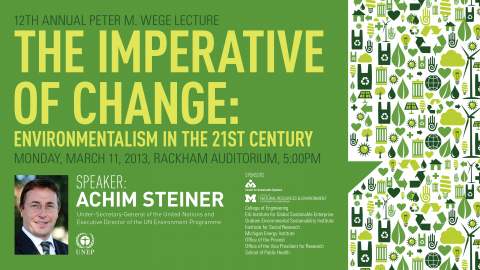12th - Achim Steiner - The Imperative of Change: Environmentalism in the 21st Century
About Achim Steiner
Since 2006, Mr. Steiner has served as the Executive Director of the United Nations Environment Programme (UNEP). The six priority areas of UNEP are:
- Climate change
- Resource efficiency
- Disasters and conflicts
- Environmental governance
- Harmful substances and hazardous waste
- Ecosystem management
Before joining UNEP, Mr. Steiner served as Director General of the International Union for Conservation of Nature (IUCN) from 2001 to 2006, and prior to that as Secretary General of the World Commission on Dams. His professional career has included assignments with governmental, non-governmental and international organizations in different parts of the world including India, Pakistan, Germany, Zimbabwe, United States, Vietnam, South Africa, Switzerland and Kenya. He worked both at the grassroots level as well as at the highest levels of international policy-making to address the interface between environmental sustainability, social equity and economic development.
Mr. Steiner, a German and Brazilian national, was born in Brazil in 1961. His educational background includes a BA from the University of Oxford and an MA from the University of London with specialization in development economics, regional planning, and international development and environmental policy. He also studied at the German Development Institute in Berlin as well as the Harvard Business School. He serves on a number of international advisory boards, including the China Council for International Cooperation on Environment and Development.
About the Lecture
Rooted in a tradition of critiquing past development choices, environmentalism has increasingly emerged as a science and empirically-based provider of analysis and risk assessment as to the environmental change phenomena occurring in our atmosphere and biosphere. The need for moving beyond questioning to providing answers and alternatives has meant that the ‘environmentalism of the 21st century’ must itself confront significant drivers of change. By drawing on ‘lessons learnt’ and exploring the implications of some of the most recent concepts shaping the environmental discourse of today – such as planetary boundaries, decoupling, the green economy, natural capital, tipping points and irreversible change, inter-generational equity and environmental rights – the lecture will reflect on some of the key reference points which will define the strategic directions for an evolving ‘environmentalism in the 21st century'. Change has become an imperative - the question is whether this environmentalism can move beyond the planetary perspective to incorporate the social and economic realities that motivate the choices people make about the future.
The Center for Sustainable Systems and School of Natural Resources and Environment present the Wege Lecture in collaboration with the following co-sponsors: College of Engineering, Erb Institute for Global Sustainable Enterprise, Graham Environmental Sustainability Institute, Institute for Social Research, Michigan Energy Institute, Office of the Provost, Office of the Vice President for Research, and School of Public Health.
Streaming videos of the 12th Wege Lecture Intro and Lecture
A transcript of the talk may be read here
